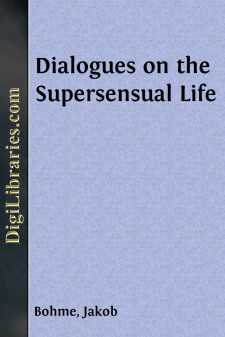Categories
- Antiques & Collectibles 13
- Architecture 36
- Art 48
- Bibles 22
- Biography & Autobiography 813
- Body, Mind & Spirit 142
- Business & Economics 28
- Children's Books 15
- Children's Fiction 12
- Computers 4
- Cooking 94
- Crafts & Hobbies 4
- Drama 346
- Education 46
- Family & Relationships 57
- Fiction 11828
- Games 19
- Gardening 17
- Health & Fitness 34
- History 1377
- House & Home 1
- Humor 147
- Juvenile Fiction 1873
- Juvenile Nonfiction 202
- Language Arts & Disciplines 88
- Law 16
- Literary Collections 686
- Literary Criticism 179
- Mathematics 13
- Medical 41
- Music 40
- Nature 179
- Non-Classifiable 1768
- Performing Arts 7
- Periodicals 1453
- Philosophy 64
- Photography 2
- Poetry 896
- Political Science 203
- Psychology 42
- Reference 154
- Religion 513
- Science 126
- Self-Help 84
- Social Science 81
- Sports & Recreation 34
- Study Aids 3
- Technology & Engineering 59
- Transportation 23
- Travel 463
- True Crime 29
Dialogues on the Supersensual Life
by: Jakob Bohme
Description:
Excerpt
PREFACE
The Works of Jacob Behmen, the "Teutonic Theosopher," translated into English, were first printed in England in the seventeenth century, between 1644 and 1662. In the following century a complete edition in four large volumes was produced by some of the disciples of William Law. This edition, completed in the year 1781, was compiled in part from the older English edition, and in part from later fragmentary translations by Law and others. It is not easily accessible to the general reader, and, moreover, the greater part of Behmen's Works could not be recommended save to those who had the time and power to plunge into that deep sea in search of the many noble pearls which it contains.
Behmen's language and way of thought are remote and strange, and in reading his thought one has often to pass it through a process of intellectual translation. This is chiefly true of his earlier work, the "Aurora" or "Morning Redness." But among those works which he wrote during the last five years of his life there are some written in a thought-language less difficult to be understood, yet containing the essential teaching of this humble Master of Divine Science. From these I have selected some which may, in a small volume, be useful. It seemed that for this purpose it would be best to take the "Dialogues of the Supersensual Life," including as one of them the beautiful, really separate, Dialogue, called in the Complete Works, "The way from darkness to true illumination." In the case of neither of these works is the translation used that of the seventeenth century. The first three dialogues are a translation made by William Law, one of the greatest masters of the English language, and found in MS. after his death. This translation from the original German is not exactly literal, but rather a liberal version, or paraphrase, the thought of Behmen being expanded and elucidated, though in nowise departed from. The dialogue called "The way from darkness to true illumination" was taken by the eighteenth century editors from a book containing translations of certain smaller treatises of Behmen then lately printed at Bristol and made, as they say, "in a style better adapted to the taste and more accommodated to the apprehension of modern readers." I do not know who was the translator, but the work seems to be excellently well done.
It will be well to say a few words first as to the life, then as to the leading ideas of Jacob Behmen. This name is more correctly written Jacob Bœhme, but I prefer to retain the more easily pronounced spelling of Behmen, adopted by the Editors of both the complete English editions.
Jacob Behmen's outward life was simplicity itself. He was born in the year 1575 at Alt Seidenberg, a village among pastoral hills, near Görlitz in Lusatia, a son of poor peasants. As a boy he watched the herds in the fields, and was then apprenticed to a shoemaker, being not enough robust for rural work. One day, when the master and his wife were out, and he was alone in the house, a stranger entered the shop and asked for a pair of shoes....


